Over the past two decades, federally funded initiatives have helped neuroscience trainees from historically marginalized and excluded backgrounds in the United States gain research experience and access to career mentoring and professional development. But diminishing federal support for diversity initiatives and training programs has these students feeling abandoned by their institutions and worried about their future.
Many of these early-career researchers from marginalized communities are seeking alternative sources of guidance. And fortunately, long before the current funding crisis began, a groundswell of trainee-led organizations emerged to fill the gaps left by traditional academic structures.
In 2016, for example, we and other neuroscience graduate students at the University of California, San Diego founded Colors of the Brain, an academic outreach and mentorship organization for trainees from historically marginalized and excluded backgrounds. Our goal was to draw directly from our experiences navigating academia as outsiders to mentor the next generation of neuroscientists. Over four years of grassroots organizing, we built a mentorship network and organized professional development workshops for first-generation undergraduate students in the San Diego area.
Some of the most transformative changes to neuroscience career training have come from trainees like us who have personally encountered systemic barriers to research careers. For example, in 2020, Colors of the Brain secured funding from the Kavli Institute for Brain and Mind to create a paid 10-week undergraduate summer research program. As we developed the program’s admissions process, we eliminated the need for recommendation letters or prior research experience, which were major obstacles we had faced at the beginning of our careers. Instead, we developed a holistic evaluation approach that prioritized candidates’ resilience and passion for neuroscience.
To date, the summer research program has trained 25 scholars, providing them with a comprehensive curriculum and generous stipends to mitigate financial burdens. A weeklong boot camp at the start of the program teaches students critical lab skills, such as computational analysis and brain histology. Scholars also receive personalized guidance through mentorship pods with a 4-to-1 ratio of graduate student mentors to undergraduates. Program evaluations show that scholars consistently report increased research confidence, a stronger sense of belonging in STEM and better preparedness for graduate education. More than three-quarters of our scholars have gone on to pursue careers in research after completing the program.
Initiatives such as ours challenge the dominant top-down model of research career mentoring. Their success demonstrates a key strength of trainee leadership—the ability to quickly identify gaps in career support and create more direct solutions. Sustaining these initiatives, however, requires commitment from the broader community.
I
ndependent, trainee-led initiatives are more important than ever for providing targeted training and mentoring support for underrepresented minorities in science—and many excellent examples exist.For instance, Cientifico Latino supports science students from minority backgrounds during the graduate school application process through its Graduate Student Mentorship Initiative (GSMI), created in 2019 by founding members Robert Fernandez, Olivia Goldman and Daisy Duan. Mentors assist undergraduates with applications and offer them useful preparation activities, such as mock interview sessions. The organization also established partnerships with universities to waive application fees. “GSMI helped 524 students matriculate to master’s or Ph.D. programs from 2019 to 2023—the majority from a low-income background, which makes me proud of the work we have done and will continue to do,” Fernandez told us.
The Biology Undergraduate and Master’s Mentorship Program at the University of California, San Diego—led by a board of graduate and undergraduate students and a supporting faculty mentor—has similarly mentored more than 1,350 students since 2020 and raised approximately half a million dollars from private institutions to fund 180 students’ participation in research programs. And 87 percent of the students reported highly productive mentor pairings, assignments made using a trainee-designed model.
Scientists on the Subway (SciSub) at Columbia University gives graduate students and postdocs an online platform to share authentic stories of underrepresented scientists. Such programs “build an honest, public representation of scientists by telling the personal stories of scientists inside and outside the lab,” says co-founder Michelle Stackmann. SciSub has helped make diverse researcher experiences more visible by publishing more than 50 scientist profiles, reaching more than 20,000 readers in the process.
Given the current political climate, it is difficult for universities to provide direct financial support for trainee-led programs such as these. But institutions can help our programs indirectly by putting us in contact with private institutions and independent donors. The trainee-led organizations mentioned above and others, such as Black in Neuro, are educational nonprofit organizations, with financial structures set up to receive backing from non-federal sources. Institutions need to let us know who to reach out to.
Lend us your network and give us space to make a case for ourselves.
The neuroscience community can no longer rely on federal funding to support research training initiatives focused on diversity, equity and inclusion. Waiting passively for future administrations to restore these funds will leave a wide gap in trainee support that will have devastating consequences for U.S. global leadership in research. Instead, we must act now, together and across all career levels, to build and sustain resilient, community-driven systems that can weather political shifts while continuing to nurture the next generation of diverse scientific talent.
This essay was written outside of the authors’ roles as a postdoctoral research fellow (Cazares) and psychiatry resident (Patiño) at the University of California, San Diego and does not necessarily reflect the views of their employer.






